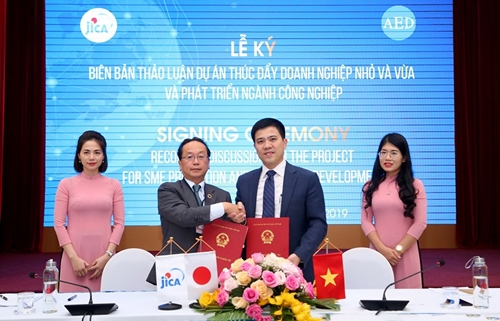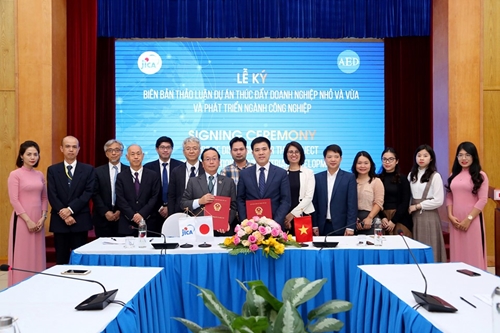Planned to be implemented between April 2020 and April 2023, the project aims at improving the connection between local small and medium enterprises (SMEs) and the global industrial value chains with the support mechanism stipulated by the SME Support Law and Supporting Industries Policies.
Under the framework of this project, local SMEs with high potential to join the global value chains - the direct beneficiary of the project, will also receive direct technical support to be able to level up and meet the standards of global industrial buyers. Local SMEs will also receive indirect support through training provided to public and private SME support consultants.
    |
 |
|
Mr. Konaka Tetsuo, Chief Representative, JICA Vietnam Office (middle left), and Mr. Le Manh Hung, Director General, Agency for Enterprise Development, MPI (middle right), signed the R/D. |
Concurrently, the existing database of agencies and organizations supporting SMEs will be reviewed for the improvement of National SMEs Website Portal, which will contribute to the development of business linkage database between local suppliers and leading industrial firms operating in Vietnam.
Vietnam lags behind other major ASEAN countries in terms of local procurement ratio. According to a survey conducted by the Japan External Trade Organization (JETRO), Japanese firms, one of the biggest foreign investors in Vietnam, procured 34.2% of its input raw materials and parts from local suppliers in 2016. This figure is much lower than that of other ASEAN countries such as Thailand (57.1%) and Indonesia (40.5%). Although the country has attracted a large number of Foreign Direct Investment (FDI) projects, the merit is still weak for the local enterprises, especially SMEs.
According to database of national business registration (MPI), there are about 750,000 active enterprises, most of which are of small and medium size. SMEs play an important role in creating jobs, reducing poverty, raising labors’ incomes, contributing to state budget and developing the economy. Non state-owned economic sector, in which SMEs are the majority, contributes 42% of GDP and more than 50% of employment.
Despite the majority in quantity, SMEs have to cope with many challenges. The lack of enterprises of big and medium size is one of the shortcomings that restrains the connection between SMEs with the global value chains.
    |
 |
|
Representatives of both sides in photo session at the signing ceremony |
In light of the above, the enactment of SME Support Law in 2018 has promulgated some specific policies to promote SMEs joining the global value chains and industrial clusters. The Politburo also requested to strengthen the role of local enterprises including SMEs by setting a target to improve the localization ratio to 30% by 2025 and accelerate this to 40% by 2030 in the Resolution No. 50-NQ/TW dated August 20, 2019.
In the effort to tackle these issues, in 2018, the Government of Vietnam requested the Government of Japan for technical cooperation to promote the implementation of SME Support Law and develop the supporting industries. Through the project’s activities, local SMEs are expected to improve its capacity, hence strengthen the business linkages with Japanese and foreign firms for the involvement into regional and global value chains.
For JICA, Industrial Development and Human Resources Development Program is under one of the three pillars of JICA’s International Cooperation Policy for Vietnam. JICA’s priority is to support improvement of technical and managerial capacity of SMEs who are the basis of the supporting industry in the strategic sectors highlighted under the Vietnamese Industrialization Strategy.
Reported by Chung Anh